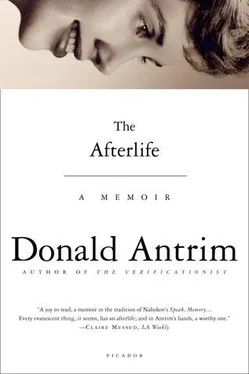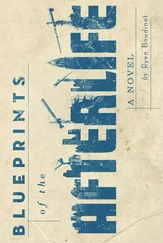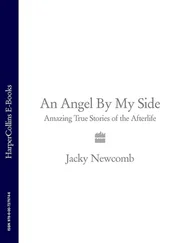Johnny Carson came on the television. We ate with our plates balanced on our laps. My uncle blanketed his pork chops beneath a layer of pepper. I did the same. The pork chops were dry and hard, and the pepper bounced off them. The television’s reception was fuzzy; its antenna had to be adjusted periodically. I was aware that I wanted to be like my uncle, aware as well that I wasn’t so sure about that. I complained to him about my father, who had begun to worry absurdly over my prospects, if I kept going the way I was going, for graduate school. Sometimes, when I complained, Bob taunted me for not having the courage to drop out of school altogether. I must have felt, somehow, that my uncle and his brother had, throughout their lives, been at odds with each other. Bob and I watched Carson host guest after guest. In my memory, this was the night that the comedian Steve Martin came on and stole the show with a cheap prop arrow sticking through his head. Or was it the night that Martin came out and did the half-a-beard routine?
I put my plate down, got up, and walked through the open glass doors to the sunporch. I heard Bob in his room, undressing. After a moment he came out and stood beside my sofa bed. He was wearing boxer shorts and a T-shirt, and he was making fun of me, but the joking had now passed the point at which it was pleasurable, because he had drunk so much.
I was standing beside the bed. He was standing beside me. He pushed me gently, and suddenly we were falling. We were wrestling on the bed. He climbed on top of me, and I squirmed beneath him. I was on my stomach and my uncle was on my back. He had my arms pinned. His movements were sluggish. We were wrestling, and then we were no longer wrestling. He forced me to stay still and be quiet. I could smell the salty, burned scent of his skin; and I could smell the warm beer on his breath as he exhaled against the side of my face. He stopped moving, and I stopped moving.
He breathed.
I breathed.
He was spread across me. His chest pressed me down into the bed. His face was next to mine.
How long did we stay like that, breathing together on the folded-out sofa? The moment did not last long. The time that elapsed was the time it took for our friendship to end. Had he passed out? Was he waiting for me to speak? Was it safe to move? I felt the dead weight of him on me, and my feelings about him, and about his way of life, changed. I perceived that this man on top of me was a drunk in his underwear, a man who ate the same food night after night in a room in his mother’s house, and I was terrified.
“Get up,” I told him. He lifted himself. He got off me. I watched him rise and walk unsteadily in bare feet to his room. The lights in his room went dark. I heard the springs squeaking inside his little bed; and I thought I saw, in the hours before I fell asleep, his mother, my grandmother, pacing behind the curtains drawn behind the glass doors leading to her room at the far end of the house. There had been a time, when I was little, that I had slept in her bed with her. But the far end of the house seemed to me, that night, after Eldridge had gone to bed, like a truly faraway place.
The next morning I told my uncle I had to leave Sarasota. I didn’t say why, and I don’t know whether he, in some way, understood. I just told him I had to go. He drove me to the station. He put me on a bus, and I rode the bus down the Tamiami Trail, stopping at the towns along the way, traveling south past Naples, southeast across the Everglades. After a long ride I saw, through the bus windows on the right, the enormous cement factory that, in those days, marked the end of the journey home.
When I was sixteen, I left Miami for boarding school in the foothills of the Blue Ridge Mountains. Two years after that, I went north to college, and four years later I moved to New York, where I still live. During these years I saw my uncle only a handful of times. My mother, in the decade after she got sober, in 1983, made an effort to stay in touch with him. At some point, he and my grandmother moved from their house to a small apartment. It was in this apartment that Eliza died, and he was left alone. For years, he worked as a prep cook in a restaurant on Siesta Key. He used to go in late, after the restaurant had closed, and work until dawn, preparing and organizing food for the cooks who came in mornings to make lunch. My uncle liked this routine, because it protected him from ever having to see or talk to another person. He told my mother that he didn’t think he could go to AA and stop drinking, because he was afraid that his anger, were he not medicated by alcohol, might cause him to harm someone.
At the age of fifty-two, he died. My mother told me later that his weight had dropped precipitously, that he’d turned yellow, that, at the end, he’d bled through his skin. And she told me a story about the last year of his life, a story about a woman no one in our family had known a thing about.
Back when he was a boy, back in that ancient time when Robert Antrim was driving over birdbaths and urns, Eldridge had known a girl who lived on a farm that neighbored his mother’s brother Tom’s property on the James River, near Amherst, Virginia. My uncle and this girl had ridden horses together. The girl fell in love with Eldridge, and she never forgot him. Like Eldridge, she grew up to live a difficult life in which she became an alcoholic and found herself alone in the world. In the year before he died, she somehow tracked him down. She came to Sarasota to be with him for whatever time they had left. She tried to get him to eat, and she measured out what he could drink. She was dying herself, of a brain tumor. She was there — ensconced in the apartment my uncle had shared with his mother — when, in 1992, my mother drove to Sarasota to say good-bye to her ex-husband’s brother, whom she liked to refer to, in the spirit of the old days, as Sam. The story goes that, at the moment Sam died, this woman none of us knew, who was alone in the apartment, saw — so she later reported to my mother, an ideal audience — bloody footprints walk across the living-room floor.
I never know what to make of these kinds of stories, or of the people who tell them. The truth of the matter is that I neither believe nor wholly discount the tale of the bloody footprints, in part because I think Eldridge should be allowed a memorable parting gesture, a gesture of — what? Loneliness? The woman from Virginia became the custodian of his ashes, which she carried home to Virginia with her. Shortly after that, she, too, died. My mother told me, years later, that this woman from the farm on the river in the foothills of the Blue Ridge had had a brother, a man who lived deep in the woods, and who was rumored to be a violent person. My mother supposed that Eldridge’s ashes might have fallen into the hands of this man.
After his brother’s death, my father drove up the Tamiami Trail to Sarasota and cleared out the apartment. There was no funeral. I asked my father what had become of Eldridge’s rifles and his records, his scuba and golf and tennis gear, and he told me that these things had been replaced by high-caliber handguns and case after unopened case of small-arms ammunition, which he, my father, had dug out of the bedroom closet and hauled back to the gun shop, where he’d convinced the owner to buy them back.

In the fall of 1988, six years after the close of my parents’ second marriage, four years before the death of Eldridge, my mother telephoned from Miami to inform me that her boyfriend, S., whom she had met in Alcoholics Anonymous, would soon be en route to New York. The reason for S.’s visit — his first since the mid-seventies, when, as a young man setting out to study painting and drawing, he’d fallen instead into drinking, and become, according to my mother, at least intermittently itinerant — was, my mother told me, to locate and, with any luck, authenticate a certain painting, a landscape that had, back when S. was an aspiring artist living in Manhattan, captivated his imagination.
Читать дальше













